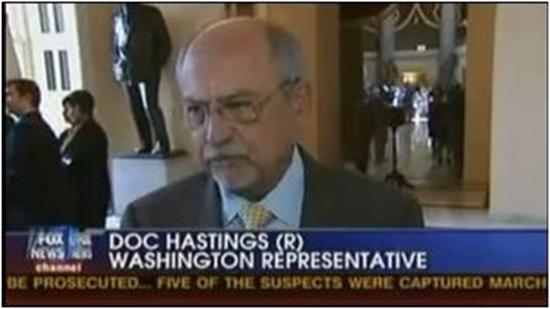In Case You Missed It
FOX News: Congressman Seeks to Expand EPA's Control of Water"It potentially puts government in charge of all waters, including mud puddles, irrigation ditches," said Rep. Doc Hastings, R-Wash. "If you take out 'navigable' in this bill, it could potentially lead to the federal government usurping state laws as it relates to water and regulating, therefore, mud puddles. I just think that's bad policy."
WASHINGTON, D.C.,
April 23, 2010
|
Jill Strait or Spencer Pederson
(202-225-2761)
Congressman Seeks to Expand EPA's Control of Water A Democratic congressman is seeking to strip the word "navigable" from the 1972 Clean Water Act to allow the Environmental Protection Agency to surpass the limits imposed by a 2001 Supreme Court ruling on the kinds of waterways the agency can regulate. That word typically is interpreted to refer to any body of water that is "deep enough and wide enough to afford passage to ships." But Rep. James Oberstar, D-Minn., who worked on the 1972 legislation as a Capitol Hill staff member, said he is trying to restore the original intent of the law. "I know what it means and it says the purpose of this act is to establish and maintain the chemical, biological and physical integrity of the nation's waters," Oberstar said. Some Republican advocates of land rights are wary, fearing that striking the word "navigable" from the Clean Water Act will bring every lake, pond, creek or mud hole under the EPA's control. "It potentially puts government in charge of all waters, including mud puddles, irrigation ditches," said Rep. Doc Hastings, R-Wash. "If you take out 'navigable' in this bill, it could potentially lead to the federal government usurping state laws as it relates to water and regulating, therefore, mud puddles. I just think that's bad policy." And that, he says, could place onerous burdens on farmers, ranchers and some small businesses. Not all Republicans are aligned against Oberstar's bill. Some feel his bill strikes the right balance. "The bill is seeking to protect all the waters of the United States from pollution," said Rep. Vernon Ehlers, R-Mich. "That's the goal. The question is where do you draw the limit." Oberstar tried in vain in 2007 to pass his water bill. Back then, the legislative waters were not "navigable," so to speak, because the Bush White House issued a veto threat. But when Democrats control Congress and the White House, chances for passage appears more likely. # # # |
Newsletter Sign Up
Sign up to receive news, updates and insights directly to your inbox.

